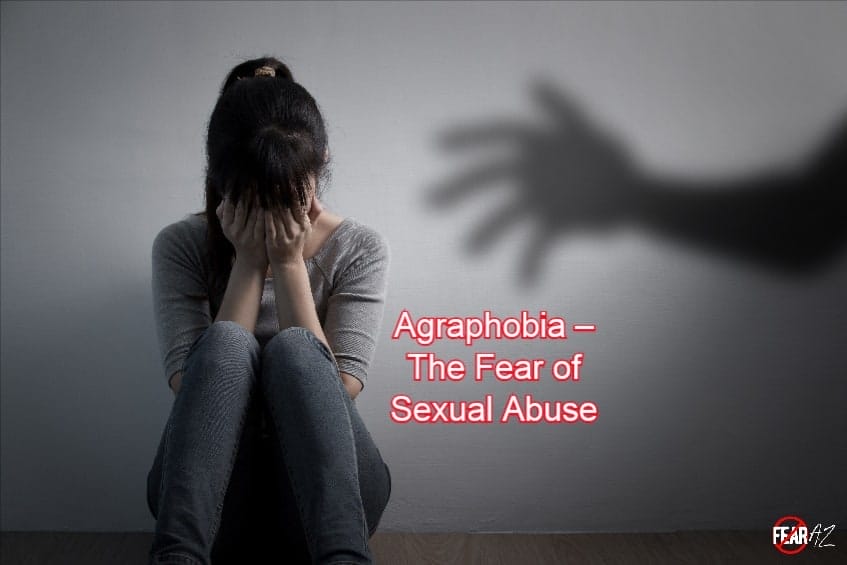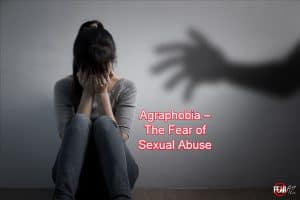Share This Article
The Fear of Sexual Abuse: A Serious Issue and Phobia
Do you avoid intimate contact, getting into romantic relationships, or going into elevators alone for fear of being sexually abused by a stranger?
It may be hard for you to understand or explain the panic attacks you experience at the mere thought of sexual abuse. Or why you turn away from intimate contact or put down every romantic advance, even when you’re interested in intimacy and may be romantically attracted to someone.
You may have agraphobia, better known as contreltophobia. Agraphobia is the fear of being sexually assaulted or abused.
Is agraphobia curable? Although debilitating, you can overcome the fear of sexual abuse with the right support and treatment. Keep reading to find out more about this unique fear, what it may entail, whether you might have it, and how to treat it.
Some Things You Need to Know about Agraphobia
Agraphobia is the fear of sexual abuse. A person who has this phobia might develop a fear response to thinking about sexual abuse or watching it.
Those with fear of sexual abuse tend to isolate themselves from other people. They may maintain a physical distance from people and keep themselves from getting emotionally close to anyone.
Some might even keep to themselves and avoid stepping out of their homes.
The fear is often confused with agoraphobia, a fear of open spaces that keeps people from leaving their homes. Another similar list of phobias also includes erotophobia, which is the fear of sex, or cypridophobia, the fear of sexual activity.
Unlike most other phobias, which are fear-based, the fear of sexual abuse is associated with emotions of disgust. The person’s fear might arise from feelings of aversion towards the abusive act.
What Causes the Fear of Sexual Abuse?
The fear of sexual abuse typically stems from a traumatic experience in the past relating to sexual abuse. This trauma isn’t necessarily related to the sufferer experiencing sexual abuse, as is common in PTSD-driven fear of sexual abuse.
The individual might have been emotionally traumatized after watching sexual abuse happening to someone else, news coverage of the incident, or even a scene in a film.
The trauma from watching sexual abuse happen to another might then become a trigger that activates a fear response to thoughts of sexual abuse. Thinking of sexual abuse or fearing an occurrence then triggers various symptoms.
The fear often grows out of proportion due to excessive worry and irrational thought. It might also develop due to sex abuse hysteria with careless investigation practices and misinformation.
Hysteria-driven fear of sexual abuse is more commonly encountered in children. It may occur in child custody cases where sexual abuse is charged.
Sometimes, a genetic predisposition to developing mental illnesses may make a person more prone to developing an irrational fear of sexual abuse.
Symptoms of Agraphobia
The fear of sexual abuse can impact a person physically and psychologically.
Depending on the root causes of agraphobia, the individual might experience various symptoms. These agraphobia symptoms may occur in response to a stimulus or even be induced by thinking about the fear.
Physical Symptoms
- Excessive shaking
- Breathlessness
- Excessive sweating
- Nausea
- Dryness of the mouth
- Anxiety attacks
- Heart palpitations
- High blood pressure
- Muscle tension
Psychological Symptoms
- Anxiety when thinking of sexual abuse
- Panic attacks
- Excessive avoidance of romantic relationships
- Feelings of frustration and irritability
- Fear of embarrassment
- Feeling disconnected
- Feeling like running away
- Fear of death or dying
Treatment
How Do You Deal with Agraphobia?
Many people experiencing mild agraphobia avoid intimacy, romantic relationships, and being in social places. While this does help keep their fearful thoughts at bay, it does more damage than healing.
Simply put, the more the sufferer avoids dealing with the fear, the more their symptoms may intensify. Eventually, this prevents them from living their life.
Left untreated, it can even lead to depression.
Self-Help
Self-help forms one of the best agraphobia treatments. Since the fear stems from irrational thinking processes, self-help can be beneficial.
Self-help practices can include a combination of exercise, nutrition, meditation, and more.
Exercise, mainly aerobic, helps the body release feel-good chemicals while reducing stress hormones in the blood. This effect is beneficial in the management and treatment of anxiety disorders.
Exercise also reduces the occurrence of symptoms while giving the person time to logicize fear-inducing situations or thoughts.
Yoga is another self-help strategy. Some poses and meditative breathing practices reduce stress responses and prevent anxiety attacks.
Eating a nutrient-dense diet also helps keep anxiety symptoms in check. Furthermore, avoiding caffeine is a must. Caffeine might help keep the person alert and awake, but it also makes them nervous and prone to panicking with the slightest triggers.
Exposure Therapy
Exposure therapy involves gradually exposing the person to their fear.
Since exposing a person to sexual abuse might do further harm, therapists may use alternate desensitization strategies like educating the sufferer about the subject of their fear.
This can help the person face their fears in a safe environment, allowing them to overcome anxiety and distress.
Cognitive Behavioral Therapy
Cognitive behavioral therapy (CBT) involves addressing thoughts centered around the fear to resolve irrational fears through logical reasoning.
CBT helps the person recognize troublesome thoughts when they occur. The therapist also teaches methods to redirect such thoughts.
CBT works to uncover the root cause of the fear and responsive behavior and teaches more pragmatic approaches.
Learning to Cope with Agraphobia
No matter what treatment or combination of treatments you choose, getting rid of your phobia can take a long time. This makes learning how to cope with fear an important step while you continue with daily life.
The first step in coping with your agraphobia lifestyle is seeking the support of those around you. Whether it is your romantic partner, family, or friends, their support can help you cope with everyday obstacles and negative thoughts as you keep working through treatment.
In Conclusion
If you’ve decided to take on the journey toward better managing agraphobia, then you’re already halfway there. All you need to do now is arm yourself with positive thoughts of overcoming your fears to truly cherish your life and those around you.





